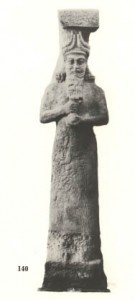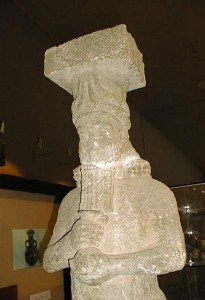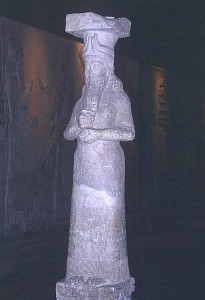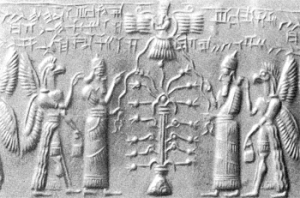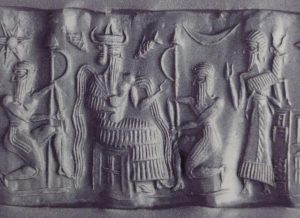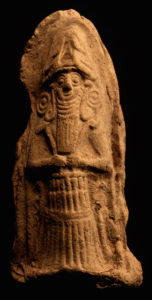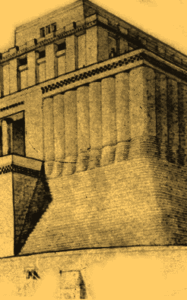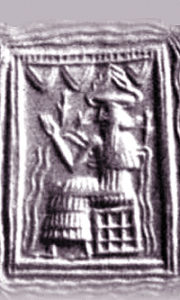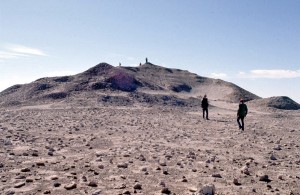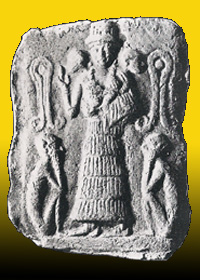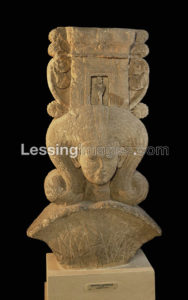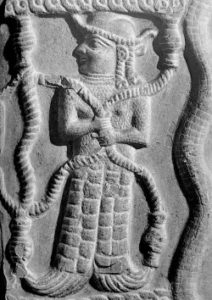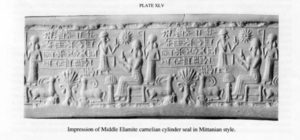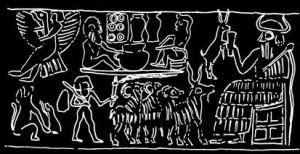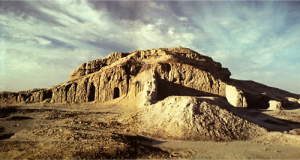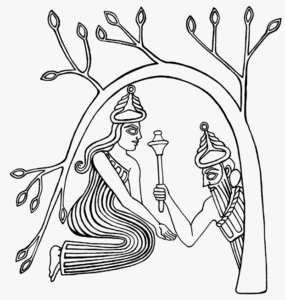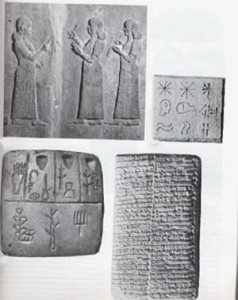|
The Electronic Text Corpus of Sumerian Literature (Texts: All Artifacts, Color Coding, & Writings in Bold Type With Italics Inside Parenthesis, are Added by Editor R. Brown, not the Authors, Translators, or Publishers!) (gods in blue) Segment A unknown no. of lines missing 1-9. The great prince Enki, …… heaven and earth, …… cherishes you.
Bride of Enki who determines fates favorably, great wild cow, exceptional in appearance, pre-eminent forever! Your husband, the great lord Nudimmud (Enki) who makes perfect the borders of the Land, (Apkulla / pilot, Enki, King Anu in his winged sky-disc, Enlil, & winged eagle-headed Apkulla / pilot) the lord on whom An (Anu) the king has bestowed perceptiveness; the wise adviser, the sage lord whose command is foremost, who is skillful in everything, the majestic leader who pleases (?) Enlil‘s heart; whose divine powers (alien technologies) cannot be withstood, he of deep understanding, called by an auspicious name,
reaching decisions …… who is knowledgeable about giving birth, ……, unknown no. of lines missing
Segment B
1-8. An the king ……. Vigorous wild cow, ……. Life and living ……. Mankind ……. The established first-fruit offerings ……. Pleasing the spirit and …… the heart, ……. Living and a long life ……. In the house where beer is poured out, …… the oil of cedars ……. (cedar fragrance of timber, oils, etc. loved by the Enlil & the Anunnaki) unknown no. of lines missing
Segment C
The great prince Enki ……. The house (?) ……. unknown no. of lines missing
Segment D 1-5. The divine powers (alien technologies) of the abzu ……. The good ……. Outstanding among ladies, your praise …….
You never cease being the wife of your Eridug (Eridu), the mountain of abundance.
She is the birth-giver of the great gods, she is their goddess. A šir-šagḫula of Damgalnuna (Damkina – Akkadian). |
Tag Archives: Texts
Gehstinanna’s (House) – Temple Hymn
The Electronic Text Corpus of Sumerian Literature
(Texts: All Artifacts, Color Coding, & Writings in Bold Type With Italics Inside Parenthesis, are Added by Editor R. Brown, not the Authors, Translators, or Publishers!)
(gods in blue)
O house Kinirša, suited for its lady, ……,
beautiful as a hill, standing by the ziqqurat,
house, ……, place resounding loudly with happiness,
house, your princess is a storm, riding on a lion, …….
Exalted in holy song and antiphony,
singing with a loud voice, the child, the true wild cow,
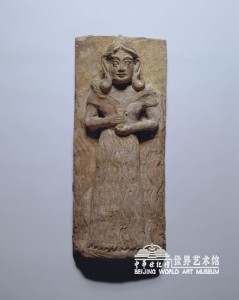 (Ninsun, mother of many mixed-breeds made into kings)
(Ninsun, mother of many mixed-breeds made into kings)
taken care of at the holy breast of the mother who begot her (Ninsun),
Dumuzid-abzu, has erected a house in your precinct,
O shrine Kinirša, and taken her seat upon your dais.
7 lines: the house of Dumuzid-abzu (Geshtinanna) in Kinirša.
The Home of the Fish: translation
The Electronic Text Corpus of Sumerian Literature
(Texts: All Artifacts, Color Coding, & Writings in Bold Type With Italics Inside Parenthesis, are Added by Editor R. Brown, not the Authors, Translators, or Publishers!)
(gods in blue… mixed-breed demigods in teal)
SEGMENT A
1-13 My fish, I have built you a home!
My fish, I have built you a house, I have built you a store!
I have built you a house bigger than a house, in fact a large sheepfold.
Inside there is incense, and I have covered it with cloths for you;
in this happy place, I …… water of joy for you;
a house not bothered by cords dividing the plots, …… in the gutters.
In the house, there is food, food of the best quality.
In the house, there is food, food in good condition.
No flies buzz around in your house where beer is poured out.
Your reputation …… cannot be alienated (?).
The threshold and the door-bolt, the ritual flour and the incense-burner are all in place.
The scent and fragrance in the house are like an aromatic cedar forest.
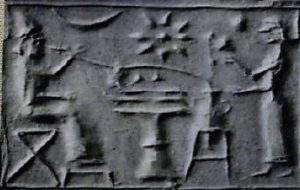 (drinking beer through straws, avoiding the thick floating mash)
(drinking beer through straws, avoiding the thick floating mash)
In the house, there is beer, there is good beer.
There is sweet beer, and honeyed cakes, extending as far as the reed fence.
14-24 Let your acquaintances come!
Let your dear ones come!
Let your father and grandfather come!
Let the sons of your elder brother and the sons of your younger brother come!
Let your little ones come, and your big ones too!
Let your wife and your children come!
Let your friends and companions come!
Let your brother-in-law and your father-in-law come!
Let the crowd by the side of your front door come!
Don’t leave your friends’ children outside!
Don’t leave your neighbors outside, whoever they may be!
25-33 Enter, my beloved son! Enter, my fine son!
Don’t let the day go by, don’t let the night come!
The moonlight should not enter that house!
But if the day has gone by and the night comes, enter and I will let you relax there;
I have made the grounds suitable for you!
Inside, I have fixed up a seat for you.
My fish, no one who sleeps there will be disturbed; no one who sits there will get involved in a quarrel.
34-39 Enter, my beloved son! Enter, my fine son!
As if you were in a river with brackish water, don’t go investigating any canals!
As if you were in silt settled on the riverbed, may you not be able to get up!
As if you were in flowing water, you should not fix your bed!
The moonlight should not enter that house!
40-44 And may you not succeed in getting away: face towards me!
And may you not succeed in getting away like a …… to your lair: face towards me!
And may you not succeed in getting away like a dog to where you go sniffing: face towards me!
And may you not succeed in getting away like a …… to where you ……: face towards me!
And may you not succeed in getting away like a bull to your cattle-pen,
like a sheep to your sheepfold: face towards me!
45-67 Now, just …… like a bull to your cattle-pen!
Enter for me, and Suen (Nannar / Sin) will be delighted with you!
Now, just …… like a sheep to your sheepfold!
(Kish King Etana ascends to heaven / planet Nibiru, & Dumuzi the Shepherd, son to Enki & Ninsun)
Enter for me, and Dumuzid (Dumuzi) will be delighted with you!
When you lift your head like a bull towards your cattle-pen,
Lord AcimbabbarSuen (Nannar) will be delighted with you!
When you raise your head like a sheep in the sheepfold,
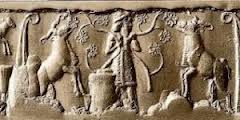 (Dumuzi the Shepherd, herder of animals, with his stags)
(Dumuzi the Shepherd, herder of animals, with his stags)
Dumuzid the shepherd will be delighted with you!
15 lines fragmentary or missing
May all kinds of fishes also enter with you, my fish!
The one with handsome barbels who eats the honey plant,
my suhur-gal fish: may he also enter with you, my fish!
The one who always eats …… reeds, ……, my suhur-tur fish: may he also enter with you, my fish!
The one with big lips, who sucks the gizi reeds,
1 line fragmentary
whose food ……, my ectub fish: may he also enter with you, my fish!
The black punting-pole, engendered in the fields,
the farrowing sow who takes away the dough from the river banks,
my gubi fish (probably = eel) : may he also enter with you, my fish!
81-95 The one with a spiny (?) tail and a spiny (?) back,
who goes ……, my ce-suhur-gal (?) fish: may he also enter with you, my fish!
The fish who is like a crying child in its prayers, my ce-suhur-sig (?) fish:
may he also enter with you, my fish!
With a pickaxe as a head, and having a comb for teeth, the branches of a fir-tree as its bones,
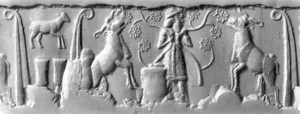 (Dumuzi, young spouse to Inanna)
(Dumuzi, young spouse to Inanna)
Dumuzid‘s water-skin for the skin of its bladder (?),
with a dehaired skin that does not need processing, with its slender tail like the fishermen’s whip,
the jumping fish, with naturally smoothed skin, with no entrails in its nose,
the fish who seizes adversaries by arms and legs, whose sting goes across like a nail,
which is taboo and is not placed as an offering in the city’s shrines,
my mur fish (= sting-ray) : may he also enter with you, my fish!
96-113 The one whose fins (?) churn the troubled waters, a fish who seizes ……
at a glance (?), my kij fish: may he also enter with you, my fish!
With a head like a small millstone, …… a dog’s head,
1 line unclear
the fish who does not eat the …… plants, ……, my jir-gid fish: may he also enter with you, my fish!
With the noise of his entrails ……, my gir fish: may he also enter with you, my fish!
The fish who ……, the fish who knows how to escape through a reed barrier,
the fish which despite being tasty is an abomination, my ab-suhur fish:
may he also enter with you, my fish!
The fish that causes breaches in dykes, with venom in its jaws, my agargar fish:
may he also enter with you, my fish!
The one whom the merchants ……, my kamar fish: may he also enter with you, my fish!
The one whom the Martu (primitive ape-like earthlings under Martu) fetch away,
my nunbar-gid (?) fish: may he also enter with you, my fish!
114-117 The fish who does not eat edible plants, ……, my azagur fish: may he also enter with you, my fish!
The one that …… a heavy skin, ……, my muc fish: may he also enter with you, my fish!
approx. 7 lines fragmentary or missing
SEGMENT B
1-7 ……, spotted (?) ……, my jiru (?) fish: may he also enter with you, my fish!
The one that the children bring in ……, my salsal fish: may he also enter with you, my fish!
The one with snake’s eyes, a …… mouse’s mouth, who …… on riverbanks,
approx. 8 lines fragmentary or missing
SEGMENT C
1-12 The one who utters its sinister cry in the marshes and rivers,
my agane bird: you would be dangling from its claws, my fish!
The one who circles the nets looking for you in the waters where the nets are stretched,
my ubure bird: you would be dangling from its claws, my fish!
The one with long legs, that laughs, the alien from faraway waters,
that writes in the mud, my ance-bar (?) bird: you would be dangling from its claws, my fish!
The one who does not adorn ……, with the …… of a bird and webbed (?) feet,
my kib bird: you would be dangling from its claws, my fish!
The one who seizes the quadrupeds that wander into the marshes,
my kuda crocodile: you would be dangling from its claws, my fish!
13-17 But you won’t be dangling from their claws, you won’t be snatched up by their feet!
Time is pressing, my fish! Just you come to me!
Time is pressing! Just you come to me!
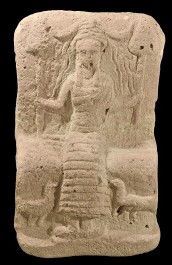
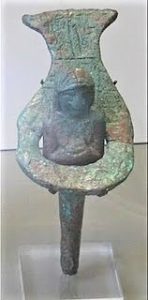 (Nanshe, Enki‘s daughter, Goddess of Persian Gulf’s Fish & Birds)
(Nanshe, Enki‘s daughter, Goddess of Persian Gulf’s Fish & Birds)
Nance, the queen of the fishermen, will be delighted with you.
Dumuzid and Ĝeštin-ana
The Electronic Text Corpus of Sumerian Literature
(Texts: All Artifacts, Color Coding, & Writings in Bold Type With Italics Inside Parenthesis, are Added by Editor R. Brown, not the Authors, Translators, or Publishers!)
(gods in blue)
1-11. A small demon opened his mouth and said to the big demon,
“Come on, let’s go to the lap of holy Inana (Inanna).”
The demons entered Unug (Uruk) and seized holy Inana.
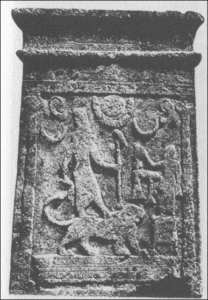
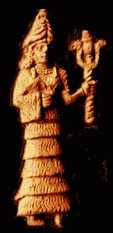 (Inanna atop zodiac symbol of Leo, & many symbols of relative gods; Inanna)
(Inanna atop zodiac symbol of Leo, & many symbols of relative gods; Inanna)
“Come on, Inana, go on that journey which is yours alone–descend to the underworld.
Go to the place which you have coveted — descend to the nether world.
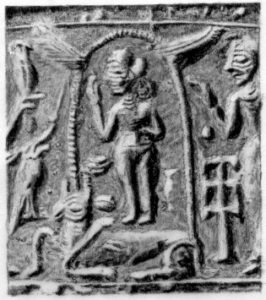 (Inanna descends to Under World to see her elder sister Ereshkigal)
(Inanna descends to Under World to see her elder sister Ereshkigal)
Go to the dwelling of Ereškigala (her sister Ereshkigal) — descend to the underworld.
Don’t put on your holy ba garment, the pala dress of ladyship — descend to the underworld.
Remove the holy headdress, that splendid ornament, from your head — descend to the underworld.
Don’t enhance your appearance with a wig — descend to the underworld.
Don’t adorn your feet with …… — descend to the underworld.
When you descend, …….”
12-21. They released holy Inana, they …… her.
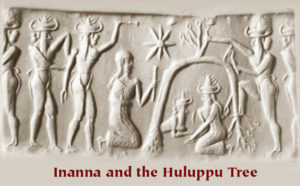
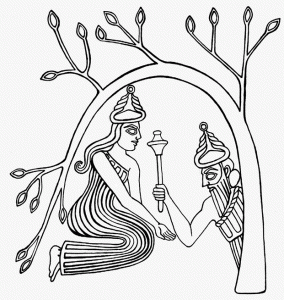 (Inanna & Dumuzi in the Under World)
(Inanna & Dumuzi in the Under World)
Inana handed over Dumuzid (Dumuzi) to them in exchange for herself.
“As for the lad, we will put his feet in foot stocks.

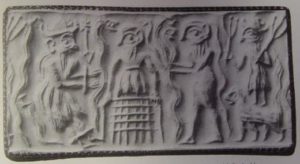 (Dumuzi the Shepherd cuffed hand & foot)
(Dumuzi the Shepherd cuffed hand & foot)
As for the lad, we will put his hands in hand stocks: we will put his neck in neck stocks.”
Copper pins, nails and pokers were raised to his face.
They sharpened their large copper axes.
As for the lad, they stood him up, they sat him down.
“Let us remove his …… garment, let us make him stand …….”
As for the lad, they bound his arms, they did evil …….
They covered his face with his own garment.
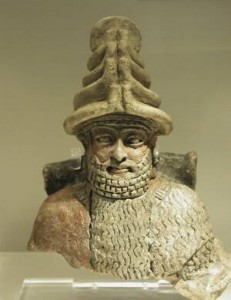 (Utu, twin to Inanna, brother to Ereshkigal, all children of Nannar, the patron god of Ur)
(Utu, twin to Inanna, brother to Ereshkigal, all children of Nannar, the patron god of Ur)
22-32. The lad raises his hands heavenward to Utu:
“O Utu, I am your friend, I am a youth.
Do you recognize me?
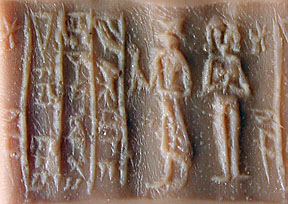 (young lovers Dumuzi & his spouse Inanna, Goddess of Love)
(young lovers Dumuzi & his spouse Inanna, Goddess of Love)
Your sister, whom I married, descended to the underworld.
Because she descended to the underworld,
it was me that she was to hand over to the underworld as a substitute.
O Utu, you are a just judge, don’t disappoint me!
Change my hands, alter my appearance, so that I may escape the clutches of my demons!
Don’t let them seize me!
Like a saĝkal snake that slithers across the meadows and mountains,
let me escape alive to the dwelling of my sister Ĝeštin-ana.”
33-46. Utu accepted his tears.
He changed his hands, he altered his appearance.
Then like a saĝkal snake that slithers across the meadows and mountains,
like a soaring falcon that can swoop down on a live (?) bird,
Dumuzid escaped alive to the dwelling of his sister Ĝeštin-ana.
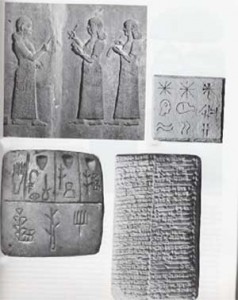 (Geshtinanna, brother to Dumuzi, scribe, singer of songs, etc.)
(Geshtinanna, brother to Dumuzi, scribe, singer of songs, etc.)
Ĝeštin-ana looked at her brother.
She scratched at her cheek: she scratched at her nose.
She looked at her sides: she …… her garment.
She recited a lament of misfortune for the unfortunate lad:
“O my brother! O my brother, lad who has not fulfilled those days!
(Kish King Etana ascends to heaven / planet Nibiru, & Dumuzi the Shepherd)
O my brother, shepherd Ama-ušumgal-ana (Dumuzi), lad who has not fulfilled those days and years!
O my brother, lad who has no wife, who has no children!
O my brother, lad who has no friend, who has no companion!
O my brother, the lad who is not a comfort (?) to his mother!”
47-56. The demons go hither and thither searching for Dumuzid.
The small demons say to the big demons:
“Demons have no mother; they have no father or mother, sister or brother, wife or children.
When …… were established on heaven and earth, you demons were there, at a man’s side like a reed enclosure.
Demons are never kind, they do not know good from evil.
Who has ever seen a man, without a family, all alone, escape with his life?
We shall go neither to the dwelling of his friend nor to the dwelling of his in-laws.
Rather, for the shepherd let us go to the dwelling of Ĝeštin-ana.”
The demons clap their hands and begin to seek him out.
57-64. Ĝeštin-ana had barely finished that lament when the demons arrived at her dwelling.
“Show us where your brother is,” they said to her.
But she spoke not a word to them.
They afflicted her loins with a skin disease, but she spoke not a word to them.
They scratched her face with ……, but she spoke not a word to them.
They …… the skin of her buttocks, but she spoke not a word to them.
They poured tar in her lap, but she spoke not a word to them.
So they could not find Dumuzid at the house of Ĝeštin-ana.
65-73. The small demons said to the big demons: “Come on, let’s go to the holy sheepfold!”
There at the holy sheepfold they caught Dumuzid.
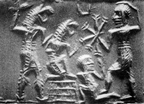 (Dumuzi captured & killed by demons & gods)
(Dumuzi captured & killed by demons & gods)
They went hither and thither until they caught him.
They searched for him until he was seen.
The ax was wielded against the lad who had no family.
They sharpened their daggers, they smashed his hut.
His sister wandered about the city like a bird because of her brother:
“My brother, let me take the great misfortune, come, let me …….”
Dumuzid’s Dream
The Electronic Text Corpus of Sumerian Literature
(Texts: All Artifacts, Color Coding, & Writings in Bold Type With Italics Inside Parenthesis, are Added by Editor R. Brown, not the Authors, Translators, or Publishers!)
(gods in blue)
1-4. His heart was full of tears as he went out into the countryside.
The lad’s heart was full of tears as he went out into the countryside.
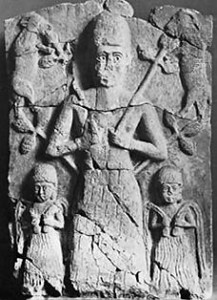 (Dumuzi the Shepherd, son to Enki & Ninsun)
(Dumuzi the Shepherd, son to Enki & Ninsun)
Dumuzid‘s heart was full of tears as he went out into the countryside.
He carried with him his {(1 ms. adds:) shepherd’s} stick on his shoulder, sobbing all the time:
5-14. “Grieve, grieve, o countryside, grieve!
O countryside, grieve! O marshes, cry out!
O …… crabs of the river, grieve!
O frogs of the river, cry out!
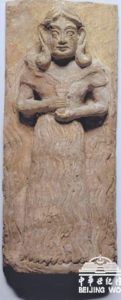 (Ninsun, mother to Dumuzi, Gishtinanna, & many semi-divines appointed to kingships)
(Ninsun, mother to Dumuzi, Gishtinanna, & many semi-divines appointed to kingships)
My mother will call to me, my mother, my Durtur (Ninsun), will call to me,
my mother will call to me for five things, my mother will call to me for ten things:
if she does not know the day when I am dead, you, o countryside, can inform my mother who bore me.
Like my little sister may you weep for me.”
5-18. In ancient times he lay down, in ancient times he lay down, in ancient times the shepherd lay down.
When in ancient times the shepherd lay down, he lay down to dream.
He woke up — it was a dream!
He shivered — it was sleep!
He rubbed his eyes, he was terrified.
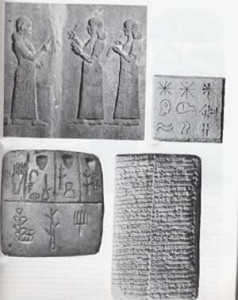 (giant female goddesses as scribe, teachers, medical care, dancers, singers of songs, etc., etc.)
(giant female goddesses as scribe, teachers, medical care, dancers, singers of songs, etc., etc.)
19-24. “Bring, bring, bring my sister!
Bring my G̃eštin-ana (Geshtinanna), bring my sister!
Bring my scribe proficient in tablets, bring my sister!
Bring my singer expert in songs, bring my singer!
Bring my perspicacious girl, bring my sister!
Bring my wise woman, who knows the meanings of dreams, bring my sister!
I will relate the dream to her.”
25-39. “A dream, my sister! A dream!
In my dream, rushes were rising up for me, rushes kept growing for me,
a single reed was shaking its head at me; twin reeds — one was being separated from me.
Tall trees in the forest were rising up together over me.
Water was poured over my holy {coals} {(1 ms. has instead:) brazier} for me, the cover of my holy churn was being removed,
my holy drinking cup was torn down from the peg where it hung, my shepherd’s stick disappeared from me.
An owl (?) took a lamb from the sheep house, a falcon caught a sparrow on the reed fence,
my male goats were dragging their dark beards in the dust for me, my rams were scratching the earth with their thick legs for me.
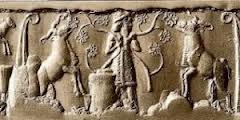 (Dumuzi & stags, herding in the mountains)
(Dumuzi & stags, herding in the mountains)
The churns were lying on their side, no milk was poured, the drinking cups were lying on their side,
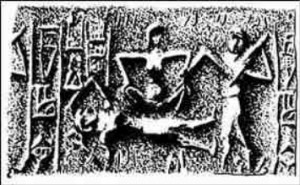 (Dumuzi‘s deceased water-damaged body discovered)
(Dumuzi‘s deceased water-damaged body discovered)
Dumuzid (Dumuzi) was dead, the sheepfold was haunted.”
41-55. G̃eštin-ana answered Dumuzid:
“My brother, your dream is not favorable, don’t tell me any more of it!
Dumuzid, your dream is not favorable, don’t tell me any more of it!
The rushes rising up for you, which kept growing for you, are bandits rising against you from their ambush.
The single reed shaking its head at you is your mother who bore you, shaking her head for you.
The twin reeds of which one was being separated from you is you and I — one will be separated from you.
The tall trees in the forest rising up together over you are the evil men catching you within the walls.
That water was poured over your holy coals means the sheepfold will become a house of silence.
That the cover of your holy churn was being removed for you means the evil man will bring it inside in his hands.”
56-69. “Your holy drinking cup being torn down from the peg where it hung is you falling off the lap of the mother who bore you.
That your shepherd’s stick disappeared from you means the demons {will set fire to it} {(1 ms. has instead:) will smash it}.
The owl (?) taking a lamb from the sheep house {is the evil man who will hit you on the cheek}
{(1 ms. has instead:) is the evil man who will destroy the sheep house}.
The falcon catching a sparrow on the reed fence is the big demon coming {down}
{(1 ms. has instead:) out} from the sheep house.
That the churns were lying on their sides, no milk was poured,
the drinking cups were lying on their sides, that Dumuzid was dead, and the sheepfold haunted,
(Dumuzi bound hand & feet; Dumuzi, earliest “modern earthling male & female, & Dumuzi the Shepherd)”
means your hands will be bound in handcuffs, your arms will be bound in fetters.
That your male goats were dragging their dark beards in the dust for you
means that my hair will whirl around in the air like a hurricane for you.
That your rams were scratching the earth with their thick legs for you
means that I shall lacerate my cheeks with my fingernails for you as if with a boxwood needle.”
70-82. Hardly had she spoken these words when he said,
“Sister, go up onto the mound, sister, go up onto the mound!
Sister, when you go up onto the mound, do not go up onto the mound like an ordinary person,
but lacerate {your heart} {(1 ms. has instead:) your hair} and your liver,
lacerate your clothes and your crotch, sister, and then go up onto the mound!
Sister, when you go up onto the mound, look out from onto the mound!
The evil ……, hated by men, …… a river barge!
They hold in their hands the wood to bind the hands,
they are identified (?) from the wood to bind the neck — no man knows how to undo it!”
83-86. Ama-g̃eštin-ana (Geshtinanna) went up onto the mound and looked around, G̃eštin-ana craned her neck.
Her girl friend G̃eštin-dudu (unidentified?) advised her:
“The big men who bind the neck are already coming for him, they are …… coming for him!'”
87-90.
“My adviser and girl friend! Are they coming?”
“Yes, I will point out to you those who bind the neck!”
“My brother, your demons are coming for you!
Duck down your head in the grass!
Dumuzid, your demons are coming for you!
Duck down your head in the grass!”
91-94. “My sister, I will duck down my head in the grass!
Don’t reveal my whereabouts to them!
I will duck down my head in the short grass!
Don’t reveal my whereabouts to them!
I will duck down my head in the tall grass!
Don’t reveal my whereabouts to them!
I will drop down into the ditches of Arali!
Don’t reveal my whereabouts to them!”
95-97. “If I reveal your whereabouts to them, may your dog devour me!
The black dog, your shepherd dog, the noble dog, your lordly dog, may your dog devour me!”
98-102. She remembered (?): “…… give your friend instructions about it!
O my brother, may you never have a friend or comrade like ……!
After the demons (?) have searched for you, ……, if he tells you …….”
103-106. “My friend, I will duck down my head in the grass!
Don’t reveal my whereabouts to them!
I will duck down my head in the short grass!
Don’t reveal my whereabouts to them!
I will duck down my head in the tall grass!
Don’t reveal my whereabouts to them!
I will drop down into the ditches of Arali!
Don’t reveal my whereabouts to them!”
107-109. “If I reveal your whereabouts to them, may your dog devour me!
The black dog, your shepherd dog, the noble dog, your lordly dog, may your dog devour me!”
110-138. Those who came for the king are a motley crew, who know not food, who know not drink, who eat no sprinkled flour,
who drink no poured water, who accept no pleasant gifts, who do not enjoy a wife’s embraces,
who never kiss dear little children, who never chew sharp-tasting garlic, who eat no fish, who eat no leeks.
There were two men of Adab who came for the king.
They were thistles in dried-up waters, they were thorns in stinking waters –
‘his hand was on the table, his tongue was in the palace’ (Alludes to a proverb) .
Then there were two men of Akšak who came for the king, with …… carried on their shoulders.
(giant alien gods King Anu’s, when visiting Earth, & Inanna‘s mud-brick-built ziggurat temple residence in Uruk)
Then there were two men of Unug (Uruk) who came for the king.
With head-smashing clubs tied to their waists, there were two men of Urim (Ur) who came for the king.
(Nannar‘s & spouse Ningal‘s mud-brick-built ziggurat temple residence in Ur, city of Biblical Abraham & family, with Stairway to Heaven)
With {shining} {(1 ms. has instead:) clean} clothes on the quayside, there were two men of Nibru who came for the king.
Crying “Man run after man!”, they came to the sheepfold and cow-pen.
They caught G̃eštin-ana at the sheepfold and cow-pen.
They offered a river of water, but she wouldn’t accept it.
They offered her a field of grain, but she wouldn’t accept it.
The little demon spoke to the big demon, the wise demon, the lively demon,
and the big demon who was between them, wise like …… destroying a ……, like …… barring a ……, they spoke:
139-150. “Who since the most ancient times has ever known a sister reveal a brother’s whereabouts?
Come! Let us go to his friend!”
Then they offered his friend a river of water, and he accepted it.
They offered him a field of grain, and he accepted it.
“My friend ducked down his head in the grass, but I don’t know his whereabouts {(1 ms. adds:)
Dumuzid ducked down his head in the grass, but I don’t know his whereabouts}”.
They looked for Dumuzid‘s head in the grass, but they couldn’t find him.
“He ducked down his head in the short grass, but I don’t know his whereabouts”.
They looked for Dumuzid‘s head in the short grass, but they couldn’t find him.
“He ducked down his head in the tall grass, but I don’t know his whereabouts”.
They looked for Dumuzid‘s head in the tall grass, but they couldn’t find him.
“He has dropped down into the ditches of Arali, but I don’t know his whereabouts”.
151-155.They caught Dumuzid in the ditches of Arali.
Dumuzid began to weep and was tear-stricken: “In the city my sister saved my life, my friend caused my death.
If a sister leaves (?) a child in the street, someone should kiss it.
But if a friend leaves (?) a child in the street, no one should kiss it.”
156-164. The men surrounded him and drained the standing waters.
They twisted a cord for him, they knotted a net for him.
They wove a reed hawser for him, they cut sticks for him.
The one in front of him threw missiles at him, the one behind him …… one cubit.
 (captured Dumuzi, bound hands & feet, pleads for help)
(captured Dumuzi, bound hands & feet, pleads for help)
His hands were bound in handcuffs, his arms were bound in fetters.
The lad raised his hands heavenward to Utu:
 (Utu, twin brother to Dumuzi‘s spouse Inanna)
(Utu, twin brother to Dumuzi‘s spouse Inanna)
165-173. “Utu, you are my brother-in-law, I am your sister’s husband!
I am he who carries food to E-ana (ziggurat residence), I am he who brought the wedding gifts to Unug (Uruk),
 (Dumuzi & his young spouse Inanna, Goddess of Love)
(Dumuzi & his young spouse Inanna, Goddess of Love)
I am he who kisses the holy lips, I am he who dances on the holy knees, the knees of Inanna.
Please change my hands into gazelle hands, change my feet into gazelle feet, so I can evade my demons.
Let me escape with my life to Ku-bireš-dildareš.”
174-180. Utu accepted his tears {(1 ms. adds:) as a gift}.
Like a merciful man he showed him mercy.
He changed his hands into gazelle hands, he changed his feet into gazelle feet,
and so he evaded the demons, and escaped with his life to Ku-bireš-dildareš.
The demons searched for him, but didn’t find him.
181-191. “Come, let us go to Ku-bireš.” {(1 ms. adds:) …… like a net …….}
They caught Dumuzid at Ku-bireš.
The men surrounded him and drained the standing waters.
They twisted a cord for him, they knotted a net for him.
They wove a reed hawser for him, they cut sticks for him,
the one in front of him threw missiles at him, the one behind him …….
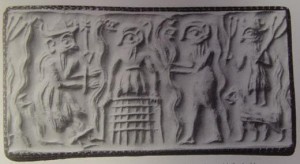 (Dumuzi‘s cuffed hands & feet)
(Dumuzi‘s cuffed hands & feet)
His hands were bound in handcuffs, his arms were bound in fetters.
The lad raised his hands heavenward to Utu:
192-199. “Utu, you are my brother-in-law, I am your sister’s husband!
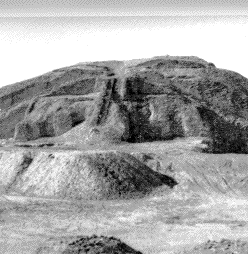 (house of giant alien gods in Uruk, & other cities, with their launch & landing site on tops of ziggurats, far away from the earthlings living in the cities way below them)
(house of giant alien gods in Uruk, & other cities, with their launch & landing site on tops of ziggurats, far away from the earthlings living in the cities way below them)
I am he who carries food to E-ana (Anu‘s temple in Uruk), I am he who brought the wedding gifts to Unug (Uruk),
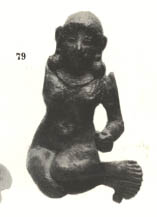 (Inanna, daughter to Nannar & Ningal, attractive young spouse to Dumuzi)
(Inanna, daughter to Nannar & Ningal, attractive young spouse to Dumuzi)
I am he who kisses the holy lips, I am he who dances on the holy knees, the knees of Inana.
Please change my hands into {gazelle} {(1 ms. has instead:) snake} hands, change my feet into {gazelle}
{(1 ms. has instead:) snake} feet, so I can escape to the house of Old Woman Belili.”
200-205. Utu accepted his tears.
He changed his hands into {gazelle} {(1 ms. has instead:) snake} hands,
he changed his feet into {gazelle} {(1 ms. has instead:) snake} feet,
so he evaded the demons and escaped with his life to the house of Old Woman Belili.
He approached the house of Old Woman Belili.
206-208. “Old woman! I am not just a man, I am the husband of a goddess!
Would you pour water — please — so I can drink water.
Would you sprinkle flour — please — so I can eat flour.”
209-212. She poured water, and she sprinkled flour, and he sat down inside the house.
The old woman left the house.
When the old woman left the house, the demons saw her.
213-226. “Unless the old woman is aware of Dumuzid‘s whereabouts, she is indeed looking frightened!
She is indeed screaming in a frightened way!
Come, let us go to the house of Old Woman Belili!”
They caught Dumuzid at the house of Old Woman Belili.
The men surrounded him and drained the standing waters.
They twisted a cord for him, they knotted a net for him.
 (Dumuzi, Biblical “Adam“, “Eve“, & Dumuzi the Shepherd)
(Dumuzi, Biblical “Adam“, “Eve“, & Dumuzi the Shepherd)
They wove a reed hawser for him, they cut sticks for him, the one in front of him threw missiles at him, the one behind him …….
His hands were bound in handcuffs, his arms were bound in fetters.
The lad raised his hands heavenward to Utu:
227-234. “Utu, you are my brother-in-law, I am your sister’s (Inanna) husband!
I am he who carries food to E-ana (Anu’s temple residence in Uruk)
I am he who brought the wedding gifts to Unug, I am he who kisses the holy lips,
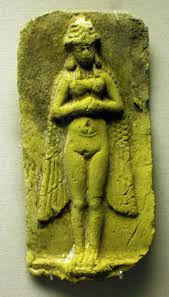
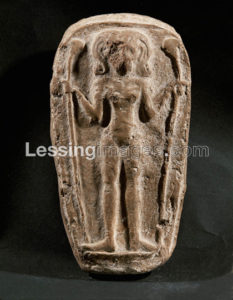 (powerful Goddess of Love, Inanna)
(powerful Goddess of Love, Inanna)
I am he who dances on the holy knees, the knees of Inanna.
Please change my hands into gazelle hands, change my feet into gazelle feet, so I can escape to the holy sheepfold, my sister’s sheepfold.”
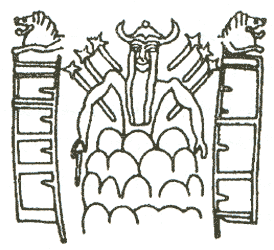
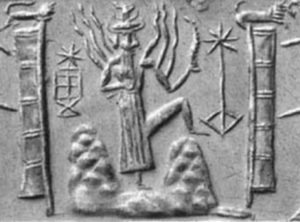 (Utu, Commander of the mountain launch & landing sites)
(Utu, Commander of the mountain launch & landing sites)
235-244. Utu accepted his tears.
He changed his hands into {gazelle} {(1 ms. has instead:) snake} hands,
he changed his feet into {gazelle} {(1 ms. has instead:) snake} feet, so he evaded the demons,
and escaped with his life to the holy sheepfold, his sister’s sheepfold.
He approached the holy sheepfold, his sister’s sheepfold.
G̃eštin-ana cried toward heaven, cried toward earth.
Her cries covered the horizon completely like a cloth, they were spread out like linen.
She lacerated her eyes, she lacerated her face, she lacerated her ears in public;
in private she lacerated her buttocks.
245-255. “My brother, I will go round in the streets …….”
(The demons said:)
“Unless G̃eštin-ana is aware of Dumuzid‘s whereabouts, she is indeed looking frightened!
She is indeed screaming in a frightened way!
Come, let us go to the sheepfold and cow-pen!”
When the first demon entered the sheepfold and cow-pen, {he set fire to the bolt} {(1 ms. has instead:) he shouted ……}.
When the second entered the sheepfold and cow-pen, he set fire to the shepherd’s stick.
When the third entered the sheepfold and cow-pen, he removed the cover of the holy churn.
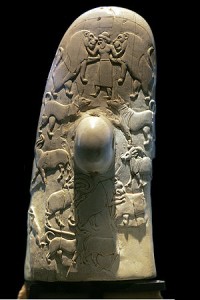
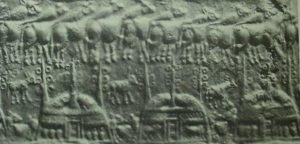 (alien cow pens of Nannar in Ur, feeding Sumer)
(alien cow pens of Nannar in Ur, feeding Sumer)
256-260. {When the fourth entered the sheepfold and cow-pen, he tore down the drinking cup from the peg where it hung.
When the fifth entered the sheepfold and cow-pen, the churns lay on their side, no milk was poured,
 (demons attack & kill giant alien god Dumuzi, Marduk is blamed by Inanna)
(demons attack & kill giant alien god Dumuzi, Marduk is blamed by Inanna)
the drinking cups lay on their side, Dumuzid was dead, the sheepfold was haunted.}
{(instead of lines 256-260, 1 ms. has:)
When the fourth entered the sheepfold and cow-pen, he poured water on my holy brazier.
When the fifth demon entered the sheepfold and cow-pen, he tore down my holy drinking cup from the peg where it hung.
When the sixth demon entered the sheepfold and cow-pen, the churns lay on their side, and no milk was poured.
When the seventh demon entered the sheepfold and cow-pen,
the drinking cups lay on their side, Dumuzid was dead, the sheepfold was haunted.}
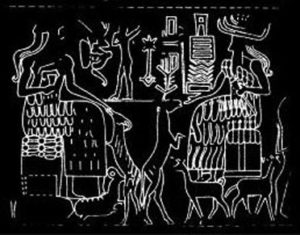 (young lovers Inanna, & spouse Dumuzi the Shepherd)
(young lovers Inanna, & spouse Dumuzi the Shepherd)
261-999. A šir-kalkal for the dead Dumuzid.
Dumuzid and His Sisters
The Electronic Text Corpus of Sumerian Literature
(Texts: All Artifacts, Color Coding, & Writings in Bold Type With Italics Inside Parenthesis, are Added by Editor R. Brown, not the Authors, Translators, or Publishers!)
(gods in blue)
|
approx. 62 lines missing …… my lacerated eyes ……. …… my lacerated nose ……. …… my beaten ……. …… my hasty ……. …… my …… 1 line fragmentary …… my ……. …… my loaded wagon ……. …… my ……. …… my ……. …… who is cheerful ……. …… who laments …….
…… the door of the gate (of the nether world) ……. My brother, …… the door of the gate …… 1 line fragmentary …… ladyship (?) ……. On the mighty river, ……. …… its fields, a waterskin ……. …… in lamenting ……. …… my …… hated …….
My brother, your feet hurt, your feet …… the road. My brother, wherever you go I will hasten with you. Dumuzid (Dumuzi), wherever you go I will hasten with you. …… I will hasten with you. I will hasten with you. …… going (?) as your slavegirl, …… of the lord, I ……. …… of the lord …… …… going (?) as your slavegirl, …… of the lord, I …….” 29-34. “My brother — because of him I cannot rejoice. (Kish King Etana ascends to heaven / planet Nibiru, & Dumuzi the Shepherd) My brother ……. Dumuzid, my brother — because of him I cannot rejoice, ……. …… in front of him ……. …… he who bound his arms went in front of him. …… he who fettered his hands went behind him. …… they who beat him went alongside him.” 35-53. …… then the elder sister spoke to him. …… she replied to him in his distress ……: “…… those men will seize him. …… let them bring ……. …… they will rip out …….” 3 lines fragmentary approx. 11 lines missing “…… you also ……. …… you also …….” …… they paid (?) attention ……. …… went along the broad road. …… went along the broad road. …… the demon confronted her. …… the demon confronted her. …… the demon confronted her. …… met her ……, the demon confronted her. ……, he tried to control (?) her. ……, as she was tearing out her hair, he tried to control (?) her. …… as she was lacerating her eyes, as she was lacerating her nose, he tried to control (?) her. …… as she …… excessively, he tried to control (?) her. …… as she spoke …… beauty …… lips, he tried to control (?) her: 69-72. “…… you, maiden, who are in a similar state (?) to the lord, are you his sister? …… who are in a similar state (?) to Dumuzid, are you his sister? …… are you the lad’s younger sister? Are you his sister?
…… are you Dumuzid‘s younger sister? Are you his sister?” 73-80. “Cut …… with my ……; I am his sister. Cut with Dumuzid (Dumuzi); I am his sister. I am the lad’s younger sister, I am his sister. I am Dumuzid‘s younger sister, I am his sister. Now, let me too be in a similar state (?) …… to him; I am his sister. Let me too be in a similar state (?) …… to him; I am his sister. If I had a cord …… on my hands, my hands would not hurt. If I had a wine jar on my shoulder, my shoulder would not hurt.” 81-85. She returned to the side of his …… and muddied (?) the water. She, Ĝeštin-ana, poured water into a crevice in the ground for him. The maiden, equipped with ……, agitated (?) the water. She agitated (?) the water, the water for the brother, ……. She agitated (?) the water, and returned it to the river: 86-88. “Return to your river! Return to your river! Return to your river! O water which my brother cannot drink, return to your river! O water which Dumuzid cannot drink, O water, return to your river!” 89-108. She heaped up the …… of the river, and muddied the Euphrates: “…… my brother is no longer alive. He will cut …… from …….
…… Dumuzid is no longer alive. He will cut …… from ……. …… is no longer alive, he is no longer alive. He will definitely not return. My …… is no longer alive. My …… is no longer alive. My …… is no longer alive. …… is no longer alive. …… is no longer alive. …… is no longer alive. …… Dumuzid is no longer alive. He will definitely not return. I cannot rejoice over …… when you were born. I cannot rejoice over …… when you were born. I cannot rejoice over …… when you were born. …… was born. …… was born. …… I, Ĝeštin, ……. …… to Dumuzid. …… I, Ĝeštin, …….” 1 line fragmentary approx. 60 lines missing (only a few traces are visible) |
Dumuzi’s (House) – Temple Hymn
The Electronic Text Corpus of Sumerian Literature
(Texts: All Artifacts, Color Coding, & Writings in Bold Type With Italics Inside Parenthesis, are Added by Editor R. Brown, not the Authors, Translators, or Publishers!)
(gods in blue)
O house where lustrous herbs are strewn upon the flowery bed,
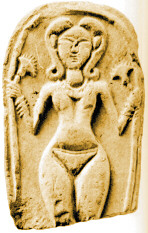 (naked Inanna in her bed-chamber, spouse to Dumuzi, & Goddess of Love)
(naked Inanna in her bed-chamber, spouse to Dumuzi, & Goddess of Love)
the bed-chamber of holy Inana, where the lady of the plain refreshes herself!
Brick-built E-muš (House which is the precinct) is flowery and holy,
its …… clay established for him who tends the ewes on the high plain.
 (Dumuzi with stags)
(Dumuzi with stags)
Your …… house of Arali (House which is the nether world) gives shade (?) to the shepherd.
Your prince, a raging lion on the plain, the šuba jewel of the Mistress whose breast is holy and marvelous,
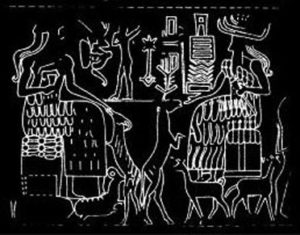 (Inanna & Dumuzi the Shepherd, son to Ninsun & Enki)
(Inanna & Dumuzi the Shepherd, son to Ninsun & Enki)
the lord who is holy Inana‘s husband, Dumuzid (Dumuzi), the sovereign of E-muš, has erected a house in your precinct,
O Bad-tibira, and taken his seat upon your dais.
10 lines: the house of Dumuzid in Bad-tibira.
Ninĝišzida’s Journey to the Nether World
The Electronic Text Corpus of Sumerian Literature
(Texts: All Artifacts, Color Coding, & Writings in Bold Type With Italics Inside Parenthesis, are Added by Editor R. Brown, not the Authors, Translators, or Publishers!)
(gods in blue…mixed-breeds in teal)
1-3. “Arise and get on board, arise, we are about to sail, arise and get on board!” —
Woe, weep for the bright daylight, as the barge is steered away! —
“I am a young man! Let me not be covered against my wishes by a cabin,
as if with a blanket, as if with a blanket!”
4-10. Stretching out a hand to the barge, to the young man being steered away on the barge,
stretching out a hand to {my young man Damu (Bau‘s son)}
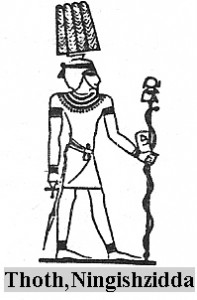 (Ningishzidda, son to Enki & Ningiridu, god of knowledge)
(Ningishzidda, son to Enki & Ningiridu, god of knowledge)
{(1 ms. has instead:) Lord Ninĝišzida} (Ningishzidda) being taken away on the barge,
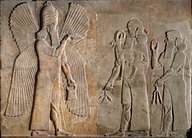 (thousands of artifacts discovered in Lagash, Ninurta‘s patron city)
(thousands of artifacts discovered in Lagash, Ninurta‘s patron city)
stretching out a hand to Ištaran (Ninurta) of the bright visage being taken away on the barge,
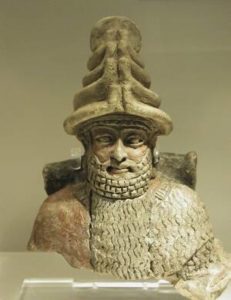 (Utu / Alla, Sun god, son to Nannar the moon crescent god of Biblical Abraham in Ur)
(Utu / Alla, Sun god, son to Nannar the moon crescent god of Biblical Abraham in Ur)
stretching out a hand to Alla (Utu), master of the battle-net, being taken away on the barge,
stretching out a hand to Lugal-šud-e (unidentified?) being taken away on the barge,
stretching out a hand to Ninĝišzida (Ningishzidda) being taken away on the barge —
his younger sister was crying in lament to him in {the boat’s cabin}
{(1 ms. has instead:) the cabin at the boat’s bow}.
11-12. His older sister removed the cover (?) from {the boat’s cabin}
{(1 ms. has instead:) the cabin at the boat’s stern}:
“Let me sail away with you, let me sail away with you, {brother}
{(1 ms. has instead:) my brother}, let me sail away with you.
{(2 mss. add 1 line:)
My brother, let me sail on your barge with you, my brother, let me sail away with you.
{(1 ms. adds 1 further line:)
Let me sail on your splendid barge with you, my brother, let me sail away with you.}}”
13-14. She was crying a lament to him at the boat’s bow: ”
{Brother} {(1 ms. has instead:) My brother}, let me sail away with you.
Let me …… for you in your boat’s stern, {brother}
{(1 ms. has instead:) my brother}, let me sail away with you.”
{(1 ms. adds 2 lines:) “The gudug priest sits in the cabin at your boat’s stern.”
She was crying a lament to him:
“Let me sail away with you, my brother, let me sail away with you.”}
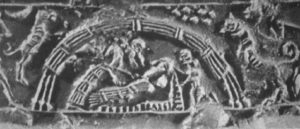 (Dr. Damu, his patient, & Damu‘s mother Bau with her guard dog)
(Dr. Damu, his patient, & Damu‘s mother Bau with her guard dog)
15-19. “My young man Damu (Bau‘s son), let me sail away with you, {brother}
{(1 ms. has instead:) my brother}, let me sail away with you.
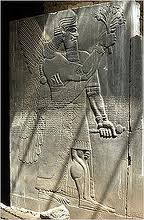 (Ninurta, son to Enlil & Ninhursag, born of the Anunnaki “double seed” law of royal succession)
(Ninurta, son to Enlil & Ninhursag, born of the Anunnaki “double seed” law of royal succession)
Ištaran (Ninurta) of the bright visage, let me sail away with you, {brother}
{(1 ms. has instead:) my brother}, let me sail away with you.
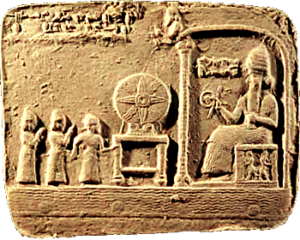 (giant alien god Utu & his wheel of justice, the alien way)
(giant alien god Utu & his wheel of justice, the alien way)
Alla (Utu), master of the battle-net, let me sail away with you, {brother}
{(1 ms. has instead:) my brother}, let me sail away with you.
Lugal-šud-e, let me sail away with you, {brother}
{(1 ms. has instead:) my brother}, let me sail away with you.
{(1 ms. adds 1 line:) Lugal-ki-bura (unidentified?), let me sail away with you,
my brother, let me sail away with you.}
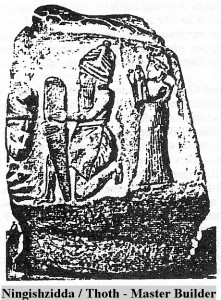
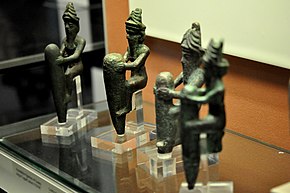 (giant Ningishzidda laid the foundation pegs to the ziggurats & pyramids found everywhere on Earth)
(giant Ningishzidda laid the foundation pegs to the ziggurats & pyramids found everywhere on Earth)
Ninĝišzida, let me sail away with you, {brother} {(1 ms. has instead:) my brother}, let me sail away with you.
{(1 ms. adds 2 lines:)
My brother, let me sail on your barge with you, my brother, let me sail away with you.
Let me sail on your splendid barge with you, my brother, let me sail away with you.}”
20-28. The evil demon who was in their midst called out to {Lugal-ki-suna} {(2 mss. have instead:) Ninĝišzida}:
“{Lugal-ki-suna} {(1 ms. has instead:) Lugal-ki-bura}, look at your sister!”
Having looked at his sister, {Lugal-ki-suna} {(1 ms. has instead:) Lugal-ki-bura} said to her:
“He sails with me, he sails with me.
Why should you sail {(1 ms. adds:) to the underworld}?
Lady, the demon sails with me.
Why should you sail {(1 ms. adds:) to the underworld}?
The thresher sails with me.
Why should you sail {(1 ms. adds:) to the underworld}?
The man who has bound my hands sails with me.
Why should you sail?
The man who has tied my arms sails with me.
Why should you sail?”
29-37. “The river of the nether world produces no water, no water is drunk from it.
{(1 ms. adds:) Why should you sail?}
The fields of the nether world produce no grain, no flour is eaten from it.
{(1 ms. adds:) Why should you sail?}
The sheep of the nether world produce no wool, no cloth is woven from it.
{(1 ms. adds:) Why should you sail?}
As for me, even if my mother digs as if for a canal,
I shall not be able to drink the water meant for me.
The waters of springtime will not be poured for me as they are for the tamarisks;
I shall not sit in the shade intended for me.
The dates I should bear like a date palm will not reveal (?) their beauty for me.
I am a field threshed by my demon — you would scream at it.
He has put manacles on my hands — you would scream at it.
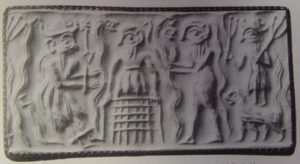 (Dumuzi the Shepherd with manacles on his hands & feet)
(Dumuzi the Shepherd with manacles on his hands & feet)
He has put a neck-stock on my neck — you would scream at it.”
38-44. Ama-šilama (Ninĝišzida‘s sister) said to Ninĝišzida:
“The ill-intentioned demon may accept something — there should be a limit to it for you.
My brother, your demon may accept something, there should be a limit to it for you.
For him let me …… from my hand the ……, there should be a limit to it for you.
For him let me …… from my hand the ……, there should be a limit to it for you.
For him let me …… from my hips the dainty lapis lazuli beads, there should be a limit to it for you.
For him let me …… from my hips the …… my lapis lazuli beads, there should be a limit to it for you.”
45-49. “You are a beloved ……, there should be a limit to it for you.
How they treat you, how they treat you! — there should be a limit to it for you.
My brother, how they treat you, how haughtily they treat you! — there should be a limit to it for you.
“I am hungry, but the bread has slipped away from me!” — there should be a limit to it for you.
“I am thirsty, but the water has slipped away from me!” – there should be a limit to it for you.”
50-54. The evil demon who was in their midst,
the clever demon, that great demon who was in their midst,
called out to the man at the boat’s bow and to the man at the boat’s stern:
“Don’t let the mooring stake be pulled out, don’t let the mooring stake be pulled out,
so that she may come on board to her brother, that this lady may come on board the barge.”
55-62. When Ama-šilama had gone on board the barge,
a cry approached the heavens, a cry approached the earth,
that great demon set up an enveloping cry before him on the river:
“Urim (Ur), at my cry to the heavens lock your houses, lock your houses, city, lock your houses!
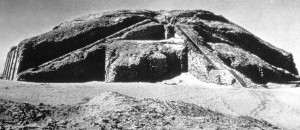 (Nannar‘s ziggurat temple residence in Ur)
(Nannar‘s ziggurat temple residence in Ur)
Shrine Urim, lock your houses, city, lock your houses!
Against your lord who has left the ĝipar, city, lock your houses!”
1 line fragmentary
approx. 1 line missing
…… a holy scepter.
…… a holy robe of office.
…… a holy crown.
…… a lapis-lazuli scepter.
70-75. He …… to the empty river, the rejoicing (?) river:
“You (addressing Ama-šilima) shall not draw near to this house, …….
…… to the place of Ereškigala (Ereshkigal).
My mother …… out of her love.
As for you (addressing the demon), you may be a great demon ……,
…… your hand against the nether world‘s office of throne-bearer.”
76-81. “My king will no longer shed tears in his eyes.
The drum will …… his joy in tears.
Come! May the fowler utter a lament for you in his well-stocked house, lord, may he utter a lament for you.
How he has been humiliated!
May the young fisherman utter a lament for you in his well-stocked house,
lord, may he utter a lament for you.
How he has been humiliated!
May the mother of the dead gudug priest {utter a lament for you in her empty ĝipar}
{( 1 ms. has instead:) , on whom the house of the palace looked with envy (?)},
utter a lament for you, lord, may she utter a lament for you.
How he has been humiliated!
May the mother high priestess utter a lament {for you who have left the ĝipar}
{(1 ms. has instead:) for you, now dead, who used to be in your ĝipar}, lord, may she utter a lament for you.
How he has been humiliated!”
82-89. “My king, bathe with water your head that has rolled in the dust.
…… in sandals your feet defiled from the defiled place.”
The king bathed with water his head that had rolled in the dust.
…… in sandals his feet defiled from the defiled place.
“Not drawing near to this house, ……. …… your throne …… to you “Sit down”.
May your bed …… to you “Lie down”.”
He ate food in his mouth, he drank choice wine.
Great holy one,
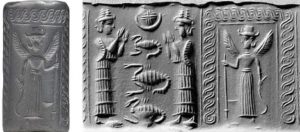 (Ereshkigal, Queen of the Under World)
(Ereshkigal, Queen of the Under World)
Ereškigala, praising you is sweet.
Nergal and Ereshkigal
The Electronic Text Corpus of Sumerian Literature
(Texts: All Artifacts, Color Coding, & Writings in Bold Type With Italics Inside Parenthesis, are Added by Editor R. Brown, not the Authors, Translators, or Publishers!)
(gods in blue)
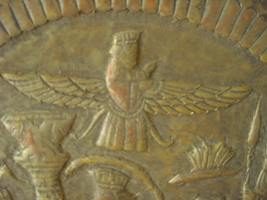
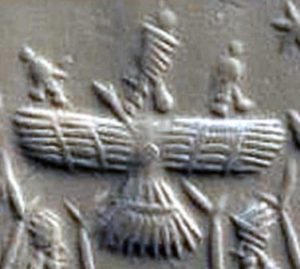 (Sky Father Anu in his winged sky-disc; Enlil, father King Anu, & brother Enki in another disc)
(Sky Father Anu in his winged sky-disc; Enlil, father King Anu, & brother Enki in another disc)
Anu made his voice heard and spoke, he addressed his words to Kakka,
“Kakka, I shall send you to Kurnugi.
You must speak thus to Ereshkigal,
Saying, ‘It is impossible for you to come up.
In your year you cannot come up to see us
And it is impossible for us to go down.
In our months we cannot go down to see you.
Let your messenger come
And take from the table, let him accept a present for you.
I shall give something to him to present to you.'”
Kakka went down the long stairway of heaven.
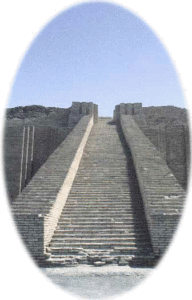
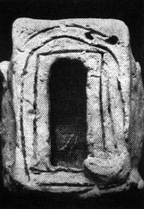 (“stairway of heaven”; gate to domain of Ereshkigal, the Under World / Nether World)
(“stairway of heaven”; gate to domain of Ereshkigal, the Under World / Nether World)
When he reached the gate of Ereshkigal, he said,
“Gatekeeper, open the gate to me!”
“Kakka, come in, and may the gate bless you.”
He let the god Kakka in through the first gate,
He let the god Kakka in through the second gate,
He let the god Kakka in through the third gate,
He let the god Kakka in through the fourth gate,
He let the god Kakka in through the fifth gate,
He let the god Kakka in through the sixth gate,
He let the god Kakka in through the seventh gate.
He entered into her spacious courtyard,
He knelt down and kissed the ground in front of her.
He straightened up, stood and addressed her,
“Anu your father sent me
To say, ‘It is impossible for you to go up;
In your year you cannot go up to see us,
And it is impossible for us to go down;
In our month we cannot go down to see you.
Let your messenger come
And take from the table, let him accept a present for you.
I shall give something to him to present to you,”‘
 (Ereshkigal seated upon her throne, Queen of the Under World)
(Ereshkigal seated upon her throne, Queen of the Under World)
Ereshkigal made her voice heard and spake, she addressed her words to Kakka.
“O messenger of Anu our father, you who have come to us,
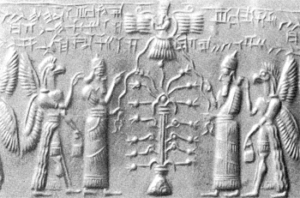 (eagle-headed & winged Apkulla / pilot, son Enki, father in heaven King Anu in his sky-disc, son Enlil, the 3 main giant gods ruling Earth Colony, & another Apkulla, minor god & pilot)
(eagle-headed & winged Apkulla / pilot, son Enki, father in heaven King Anu in his sky-disc, son Enlil, the 3 main giant gods ruling Earth Colony, & another Apkulla, minor god & pilot)
May peace be with Anu, Ellil (Enlil), and Ea (Enki), the great gods.
May peace be with Nammu (Bau‘s mother) and Nash (Bau / Guda), the pure Goddesses.
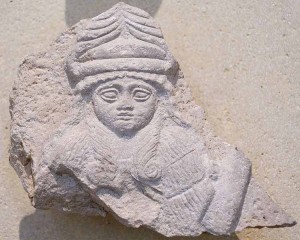 (Royal Princess Bau / Nash, daughter to King Anu, medical doctor, prison warden, etc.)
(Royal Princess Bau / Nash, daughter to King Anu, medical doctor, prison warden, etc.)
May peace be with the husband of the Lady of Heaven.
May peace be with Ninurta, champion in the land.”
Kakka made his voice heard and spake, he addressed his words to Ereshkigal,
“Peace is indeed with Anu, Ellil, and Ea (Enki), the great gods.
Peace is indeed with Nammu (Bau’s mother) and Nash the pure.
Peace is indeed with the husband of the Lady of Heaven.
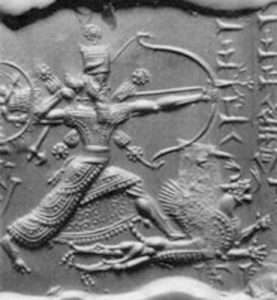 (Ninurta, son to Enlil & Enlil‘s 1/2 sister Ninhursag, “double seed” heir to Enlil)
(Ninurta, son to Enlil & Enlil‘s 1/2 sister Ninhursag, “double seed” heir to Enlil)
Peace is indeed with Ninurta, champion in the land.”
Kakka made his voice heard and spake, he addressed his words to Ereshkigal,
“[ ] may be well with you.”
Ereshkigal made her voice heard and spake, she addressed her words to her vizier Namtar,
“O Namtar my vizier, I shall send you to the heaven of our father Anu.
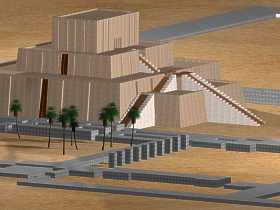 (re-creation of Anu‘s ziggurat residence in Uruk, stairway to god)
(re-creation of Anu‘s ziggurat residence in Uruk, stairway to god)
Namtar, go up the long stairway of heaven.
Take from the table and accept a present for me.
Whatever Anu gives to you, you must present to me.”
(about 26 lines missing)
“[ ]
[ ] path [ ]
The gods are kneeling together before him.
The great gods, the lords of destiny.
For it is he who controls the rites, controls the rites of [ ]
The gods who dwell within Erkalla (Ereshkigal‘s temple residence in Under World).
Why do you not kneel before him?
I keep winking at you,
But you pretend no to realize,
And…”
(6 lines missing)
(Nergal addresses Ea– apparently expressing a wish to visit Ereshkigal)
“[ ] I will rise to my feet
[ ] you said.
[ ] will double it.”
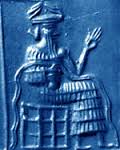 (Ea / Enki, King Anu‘s eldest & wisest son, 1st to land on Earth with his crew of 50)
(Ea / Enki, King Anu‘s eldest & wisest son, 1st to land on Earth with his crew of 50)
When Ea heard this he said to himself, “[ ]”
Then Ea made his voice heard and spake, he addressed his words to Nergal.
“My son, you shall go on the journey you want to make, … grasp a sword in your hand.
Go down to the forest of mesu trees.
Cut down mesu trees, tiaru trees, and juniper!
Break off kanaktu trees and simberru trees.”
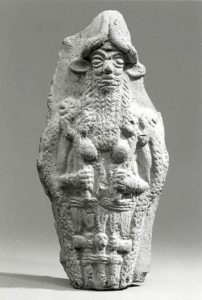
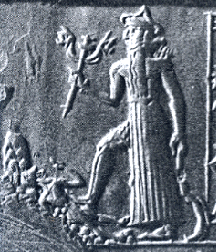 (Nergal, Enki‘s son, Anunnaki Lord of the Under World, nuclear destroyer of mountains, cities, etc.)
(Nergal, Enki‘s son, Anunnaki Lord of the Under World, nuclear destroyer of mountains, cities, etc.)
When Nergal heard this, he took an ax up in his hand,
Drew the sword from his belt,
Went down to the forest of mesu trees,
Cut down mesu trees, tiaru trees, and juniper,
Broke off kanaktu trees and simberru trees, [ ] he made a throne for far-sighted Ea.
He painted it with [ ] as a substitute for silver,
Painted it with yellow paste and red paste as a substitute for gold,
Painted it with blue glaze as a substitute for lapis lazuli.
The work was finished, the chair complete.
Then he (Ea) called out and laid down instructions for him,
“My son (of Enki‘s), about the journey which you want to make: from the moment you arrive,
Follow whatever instructions I give you.
From the moment they bring a chair to you,
Do not go to it, do not sit upon it.
When the baker brings you bread, do not go to it, do not eat the bread.
When the butcher brings you meat, do not go to it, do not eat the meat.
When the brewer brings you beer, do not go to it, do not drink the beer.
When they bring you a foot bath, do not go to it, do not wash your feet.
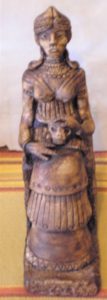 (Ereshkigal, some texts daughter to Anu, some texts daughter to Nannar)
(Ereshkigal, some texts daughter to Anu, some texts daughter to Nannar)
When she (Ereshkigal) has been to the bath
And dressed herself in a fine robe,
Allowing you to glimpse her body…
You must not do that which men and women do.”
Nergal set his face toward Kurnugi,
To the dark house, dwelling of Erkalla’s god,
To the house which those who enter cannot leave,
On the road where traveling is one way only,
To the house where those who enter are deprived of light,
Where dust is their food, clay their bread.
They are clothed, like birds, with feathers.
They see no light, the dwell in darkness.
They moan like doves.
The gatekeeper opened his mouth and addressed his words to Nergal,
“I must take back a report about the god standing at the door.”
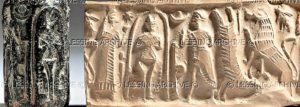 (Eeshkigal, naked sister Inanna, & gatekeeper Namtar)
(Eeshkigal, naked sister Inanna, & gatekeeper Namtar)
The gatekeeper entered and addressed his words to Ereshkigal,
“May lady, a [ ] has come to see us.
[ ] will identify him.”
Ereshkigal made her voice heard and spake to Namtar, “[ ]”
(Namtar replies)
“Let me identify him,
Let me … him at the outer gate.
Let me bring back to my lord a description of him.”
 (Nergal, alien who teamed up with Ninurta to nuclear strike Marduk & sons)
(Nergal, alien who teamed up with Ninurta to nuclear strike Marduk & sons)
Namtar went and looked at Erra (Nergal) in the shadow of the door.
Namtar‘s face went as livid as cut tamarisk.
His lips grew dark as the rim of a kuninu vessle.
Namtar went and addressed his lady,
“My lady, when you sent me to your father,
When I entered the courtyard of Anu
All the gods were kneeling, humbled before him,
All the gods of the land were kneeling humbled before him.
The gods rose to their feet in my presence.
Now ‘they’ (Nergal) have gone down to Kurnugi.”
Ereshkigal made her voice heard and spake, she addressed her words to Namtar,
“My dear Namtar, you should not seek Ellil power,
Nor should you desire to do heroic deeds.
What, come up and sit on the throne of the royal dais?
You, perform the judgments of the broad Earth?
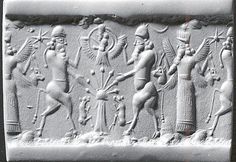 (alien Anunnaki King Anu in his winged sky-disc, father in heaven / planet Nibiru to Royal Prince-Leaders Enki & Enlil, tasked by Anu to colonize the Earth, generations of them were then born on Earth, each wanting controls over earthlings)
(alien Anunnaki King Anu in his winged sky-disc, father in heaven / planet Nibiru to Royal Prince-Leaders Enki & Enlil, tasked by Anu to colonize the Earth, generations of them were then born on Earth, each wanting controls over earthlings)
Should I go up to the heaven of Anu my father?
Should I eat the bread of the Anunnaki?
Should I drink the water of the Anunnaki?
Go and bring the god into my presence!”
Namtar went and let in ‘the Gods’, Erra (Nergal).
He let Nergal in through the first, the gate of Nedu.
He let Nergal in through the second, the gate of Enkishar.
He let Nergal in through the third, the gate of Endashurimma.
He let Nergal in through the fourth, the gate of Enuralla.
He let Nergal in through the fifth, the gate of Endukuga.
He let Nergal in through the sixth, the gate of Endushuba.
He let Nergal in through the seventh, the gate (Earth is 7 planets away from Anunnaki planet Nibiru) of Ennugigi.
He came into the broad courtyard,
And he knelt down, kissed the ground in front of her.
He straightened up, stood and addressed her,
“Anu your father sent me to see you,
Saying, ‘Sit down on that throne,
Judge the cases of the great gods,
The great gods who live within Erkalla!'”
As soon as they brought him to a throne
He did not go to it, and did not sit on it.
When the baker brought him bread, he did not go to it, and did not eat the bread.
When the butcher brought him mean, he did not go to it, and did not eat the meat.
When the brewer brought him beer, he did not go to it, and did not drink the beer.
When they brought him a footbath, he did not go to it, and did not wash his feet.
When she went to the bath,
And dressed herself in a fine robe,
And allowed him to catch a glimpse of her body,
He resisted his heart’s desire to do what men and women do.
(about 13 lines missing)
Nergal [ ]
She went to the bath
And dressed in a fine robe, and allowed him to catch a glimpse of her body.
He gave in to his heart’s desire to do what men and women do.
The two embraced each other
And went passionately to bed.
They lay there, queen Ereshkigal and Erra, for a first day and a second day.
They lay there, queen Ereshkigal and Erra, for a third day and a fourth day.
They lay there, queen Ereshkigal and Erra, for a fifth day and a sixth day.
When the seventh day arrived,
Nergal, without [ ]
Took away after him [ ] “let me go, and my sister [ ]
Do not make tremble [ ]
Let me go now, and I will return to Kurnugi later.”
Her mouth turned dark with rage [ ]
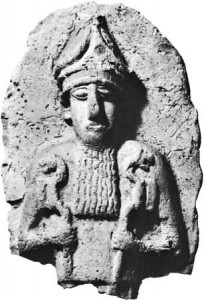 (warrior god Nergal, some texts Enlil‘s son, some texts Enki‘s son)
(warrior god Nergal, some texts Enlil‘s son, some texts Enki‘s son)
Nergal went and made his voice heard and spake.
He addressed his speech to the gatekeeper,
“Ereshkigal your lady sent me,
Saying, ‘I am sending you to the heaven of Anu our father’
So let me be allowed out! The message [ ].”
Nergal came up along the long stairway of heaven.
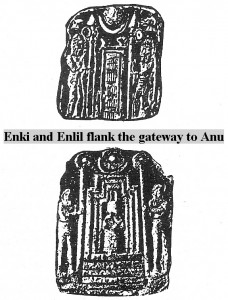 (gate of heaven with King Anu on his throne over entire planet of Nibiru)
(gate of heaven with King Anu on his throne over entire planet of Nibiru)
When he arrived at the gate of Anu, Ellil (Enlil), and Ea (Enki), Anu, Ellil, and Ea saw him and said,
“The son of Ishtar (Inanna) has come back to us,
She (Ereshkigal) will search for him and [ ].
Ea his father must sprinkle him with spring water, and bareheaded,
Blinking and cringing let him sit in the assembly of the gods.”
Ereshkigal [ ]
To the bath [ ]
Her body [ ]
She called out [ ]
“The chair [ ]
Sprinkle the room with the water of [ ]
Sprinkle the room with the water of [ ]
Sprinkle the room with the water of [ ]
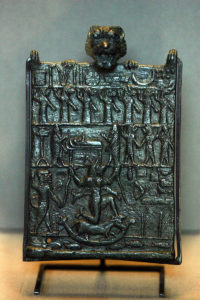
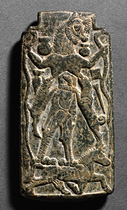 (Lamatsu / Lamashtu, alien demon)
(Lamatsu / Lamashtu, alien demon)
The [ ] of the two daughters of Lamashtu (demon) and Enmesharra (Enmecara, Enlil’s uncle),
Sprinkle with the waters of [ ].
The messenger of Anu our father who came to see us
Shall eat our bread and drink our water.”
Namtar made his voice heard and spake,
Addressed his words to Ereshkigal his lady,
“The messenger of Anu our father who came to see us-
Before daylight he disappeared!”
Ereshkigal cried aloud, grievously,
Fell from the throne to the ground,
Then straightened up from the ground.
Her tears flowed down her cheeks.
“Erra (Nergal), the lover of my delight– I did not have enough delight with him before he left!
Erra, the love of my delight- I did not have enough delight with him before he left.”
Namtar made his voice heard and spake, addressed his words to Ereshkigal,
“Send me to Anu your father, and let me arrest the god!
Let me take him to you, that he may kiss you again!”
Ereshkigal made her voice heard and spake,
Addressed her words to Namtar her vizier,
“Go, Namtar, you must speak to Anu, Ellil (Enlil), and Ea!
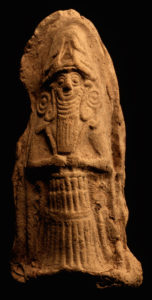
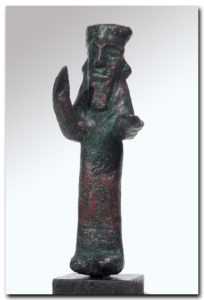
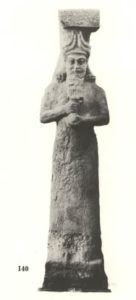 (King Anu, son & heir Prince Enlil, & eldest son Prince Enki)
(King Anu, son & heir Prince Enlil, & eldest son Prince Enki)
Set your face towards the gate of Anu, Ellil, and Ea,
To say, ‘Ever since I was a child and a daughter,
I have not known the playing of other girls,
I have not known the romping of children.
That god whom you sent to me and who has impregnated me- let him sleep with me again!
Send that god to us, and let him spend the night with me as my lover!
I am unclean, and I am not pure enough to perform the judging of the great gods,
The great gods who dwell within Erkalla.
If you do not send that god to me
According to the rites of Erkalla (Ereshkigal‘s residence in Under World) and the great Earth
I shall raise up the dead, and they will eat the living.
I shall make the dead outnumber the living!'”
Namtar came up the long stairway of heaven.
When he arrived at the gate of Anu, Ellil, and Ea,
Anu, Ellil, and Ea saw him and said,
“What have you come for, Namtar?”
“Your daughter sent me,
To say, ‘Ever since I was a child and a daughter,
I have not known the playing of other girls,
I have not known the romping of children.
That god whom you sent to me and who has impregnated me- let him sleep with me again!
Send that god to us, and let him spend the night with me as my lover!
I am unclean, and I am not pure enough to perform the judging of the great gods,
The great gods who dwell within Erkalla.
If you do not send that god to me
According to the rites of Erkalla and the great Earth I shall raise up the dead, and they will eat the living.
I shall make the dead outnumber the living!'”
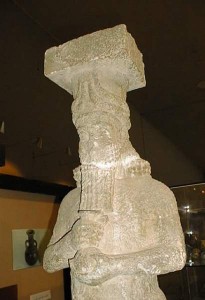 (Enki, wisest god who could save Anunnaki lives, could enter & safely leave the Under World)
(Enki, wisest god who could save Anunnaki lives, could enter & safely leave the Under World)
Ea made his voice heard and spake, addressed his words to Namtar,
“Enter, Namtar, the court of Anu,
Search out your wrongdoer and bring him!”
When he entered the court of Anu,
All the gods were kneeling humbly before him,
All the gods of the land were kneeling humbled before him.
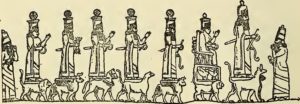 (alien Anunnaki royal descendants of King Anu on Earth)
(alien Anunnaki royal descendants of King Anu on Earth)
He went straight up to one, but did not recognize that god,
Went straight up to a second and a third, but did not recognize that god either.
Namtar went, and addressed his words to his lady,
“My lady, about your sending me up to the heaven of Anu your father:
May lady, there was only one god who sat bareheaded, blinking, and cringing at the assembly of the gods.”
“Go, seize that god and bring him to me!
Ea his father sprinkled him with spring water,
And he is sitting in the assembly of all the gods bareheaded, blinking, and cringing.”
Namtar came up the long stairway of heaven.
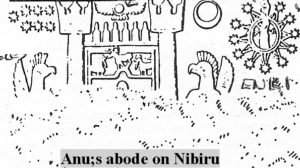 (gate of King Anu, Apkulla / pilots, & many symbols of certain gods)
(gate of King Anu, Apkulla / pilots, & many symbols of certain gods)
When he reached the gate of Anu, Ellil, and Ea, Anu, Ellil, and Ea saw him and said,
“What have you come for, Namtar?”
“Your daughter sent me,
To say, ‘Seize that god and bring him to me.'”
“Then enter, Namtar, the courtyard of Anu, and search out your wrongdoer and take him.”
He went straight up to one god, but did not recognize him,
Went straight up to a second and third, but did not recognize him either.
Then [ ] made his voice heard and spake, addressed his words to Ea,
“Let Namtar, the messenger who has come to us,
Drink our water, wash, and anoint himself.”
(15 lines missing)
“He is not to strip off [ ] Erra,
[ ] I shall [ ]”
Namtar made his voice heard and spake, addressed his words to Erra,
“Erra, [ ]
All the rites of the great Underworld [ ]
When you go from [ ]
You shall carry the chair [ ]
You shall carry [ ]
You shall carry [ ]
You shall carry [ ]
You shall carry [ ]
You shall carry [ ] [ ]
Do not grapple with him lest he bind your chest.”
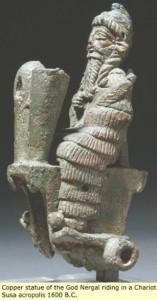 (Anunnaki warrior god Nergal in his sky-chariot)
(Anunnaki warrior god Nergal in his sky-chariot)
Erra took to heart the speech of Namtar.
He [ ] oiled his strap and slung his bow.
Nergal went down the long stairway of heaven.
When he arrived at the gate of Ereshkigal he said, “Gatekeeper, open [ ]!”
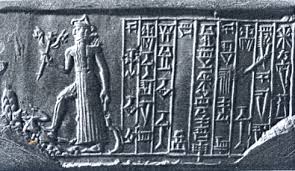 (Nergal with his high-tech alien weaponry)
(Nergal with his high-tech alien weaponry)
He struck down Nedu, the doorman of the first gate, and did not let him grapple with him.
He struck down the second doorman, and did not let him grapple with him.
He struck down the third doorman, and did not let him grapple with him.
He struck down the fourth doorman, and did not let him grapple with him.
He struck down the fifth doorman, and did not let him grapple with him.
He struck down the sixth doorman, and did not let him grapple with him.
He struck down the seventh doorman, and did not let him grapple with him.
He entered her wide courtyard,
And went up to her and laughed.
He seized her by her hairdo,
And pulled her from the throne.
He seized her by her tresses [ ].
The two embraced each other
And went passionately to bed.
They lay there, queen Ereshkigal and Erra (Nergal), for a first day and a second day.
They lay there, queen Ereshkigal and Erra, for a third day.
They lay there, queen Ereshkigal and Erra, for a fourth day.
They lay there, queen Ereshkigal and Erra, for a fifth day.
They lay there, queen Ereshkigal and Erra, for a sixth day.
When the seventh day arrived, Anu made his voice heard and spoke,
Addressed his words to Kakka, his vizier, “Kakka, I shall send you to Kurnugi (Under World ziggurat),
To the home of Ereshkigal who dwells within Erkalla (Under World),
To say, “That god, whom I sent you,
Forever [ ]
Those above [ ]
Those below [ ]
(about 20 – 25 lines missing at end)
An Elegy on the Death of Nannaya (Elegy 1): Translation
The Electronic Text Corpus of Sumerian Literature
(Texts: All Artifacts, Color Coding, & Writings in Bold Type With Italics Inside Parenthesis, are Added by Editor R. Brown, not the Authors, Translators, or Publishers!)
(gods in blue …mixed-breed demigods in teal…)
1-2 A father sent a message to his son, to a far-off place;
at that time the son, having gone to a distant place, was far away.
3-8 The city-dwelling father was stricken with illness.
He, precious brilliance found in a distant mountain (?), was stricken with illness.
He, attractive in ……, a man who made words pleasing, was stricken with illness.
He who had a tall figure, and altogether was powerful, was stricken with illness.
He, wise in divine plans and an ornament of the assembly, was stricken with illness.
He who was a man of truth, god-fearing, was stricken with illness.
9-15 He, not eating, was stricken with illness and was languishing away (?).
Having closed his mouth, he ate no food and lay famished.
According to a tablet …….
The warrior, a wanderer (?), did not move a foot.
From (?) his sick …… he was consumed with wailing for his children.
Heart anguished, overcome by wailing, the scholar died a violent death in Nibru (Nippur).
16-19 This matter reached his son on the distant journey.
Like a son who does not depend closely on his father,
he had not returned the message which had been sent (?) to him.
Now the son shed tears, threw himself to the dust and performed a musical song for him.
20-32 Lu-dijira out of his inflamed heart wrote a lament:
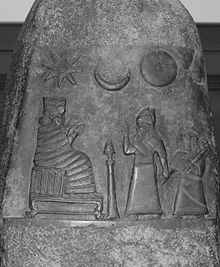 (giant goddess Nanaya, spouse to Nabu, & earthlings)
(giant goddess Nanaya, spouse to Nabu, & earthlings)
“O father who has died a violent death, O Nannaya (1 ms. has instead: my Nannaya),
who through the evil planned against him has been carried off to the nether world,
your wife’s husband is a thing of the past, forever she will be a widow —
wheels (?) about you like a whirlwind, …….
She used to treat you as a foster-child — now her reason is gone.
Stupor has fallen upon her as if she were about to give birth.
She turns the ……, moans (?) like a cow.
She …… a lament, and sheds tears.
She has covered up its …… and has taken (?) what is just (?).
1 line fragmentary
The one who gathers (?) ……. …… touches you, the heart …… is heavy (?).
33-39 “The one who (?) rises (?) …… at dawn (?) from among the ……
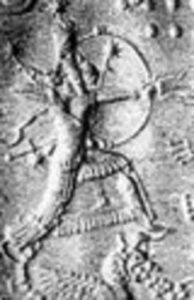 (Ninurta, son & heir to Enlil the Earth Colony Commander)
(Ninurta, son & heir to Enlil the Earth Colony Commander)
who dwell in ……, the lukur priestess of Ninurta from the ……, has thrown …….
Like a mourning (?) god (?), she …….
Her shouts (?) …… evil.
In the midst of the cloister (?) she (?) …….
1 line fragmentary
…… has made (?) the widespread people …… grain and …….
40-46 “The confusion of battles …… the nin-dijir priestess of Nuska (Enlil‘s minister).
She tears apart (?) …… for you, …… for you her (?) …….
5 lines fragmentary
47-55 “Your sons who were treated (?) like king’s sons,
whatever they (?) eat ……, whatever they (?) drink …….
They (?) …… honey and ghee.
They load the table with (?) oil for you.
The tears which they shed for him are tears of compassion.
Their mourning (?) for him is that of loving and pure-hearted ones.
They are bent over like over-ripe grain.
The fledglings return ……, raise …….
56-62 “Over the brides of your sons who have said
“Where, where is he now?” your …… has fallen.
In their …… has been silenced (?) for you.
On the laps of the household …… for you.
Your …… sweet sounds …… sleep …… has been …… like …….
The …… lament for you …… does not (?) cease.
63-69 “O my father, may your heart be at rest.
O Nannaya, may your spirit be pleased.
The en and ensi …….
Those who have escaped the hand of death …….
The hand of death has been …… in their …….
Death is the favor of the gods, the place where fate is decreed …….
May your offspring …… your knee.
70-76 “Your daughters have …… for you in their …….
The elders of your city have set up (?) mourning (?) for you.
The young women of your city have …… for you.
The slave at the grindstone …… has shed (?) tears for you.
The house where he is placed (?) …….
He has …… silver, has acquired grain, has …… wide possessions.
May the eldest son …… for you your …… firm foundations.
77-84 “As for your murderer who …… like one who …… the heart, your ……
who plotted malice against you — true (?) execution belongs to the king,
 (Utu, son to Nannar & Ningal, symbolized as the Sun god)
(Utu, son to Nannar & Ningal, symbolized as the Sun god)
the shepherd, your god; true (?) counsel belongs to Utu.
May that man be a man accursed, death ……. …… his bones.
May the names of his offspring …….
May their possessions …… like birds flying away.
85-87 “May the …… of the Land …….
May he bring you favorable …… words, may they make you content.
O Nannaya, may your spirit be pleased, may your heart be at rest.
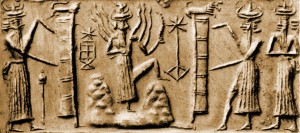 (Utu cut launch & landing pads into the mountain tops)
(Utu cut launch & landing pads into the mountain tops)
88-98 “Utu, the great lord of the nether world,
after turning the dark places to light, will judge your case.
May Nanna (Nannar / Sin) decree your fate on the day of sleep.
Nergal, the Enlil of the underworld, …… before it,
may the …… utter your name, may he cause you to eat fresh food.
May you be …… of the underworld, and may she have pity on you.
May your household bring fresh water to the libation place.
May lord Ninjiczida (Ningishzidda) …… the house …….
May the mighty Gilgamec (Gilgamesh) …… health for you.
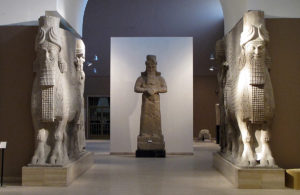 (Nabu, son to Marduk statue in museum)
(Nabu, son to Marduk statue in museum)
May Nedu (Nabu) and Etana be your helpers.
May the god of the underworld utter prayers for you.
99-103 “May your god say “Enough!”, may he …… your fate.
May the god of your city …… compassion on you.
May he release you from wrath and sin.
May he erase the reckoning of the guilt of your house.
…… the evil planned against you …….
104-112 “May your descendants be happy, …….
May …….
May the protective gods and goddesses …… your …….
May the children you begot be written down for privilege (?).
May your daughters have divine favor.
May your wife stay well, may your kin multiply.
May prosperity and well-being (?) surround them day in day out.
May good beer never cease in your libation tube.
May the invocation (1 ms. has instead: incantation) of your house
be forever the invocation (1 ms. has instead: incantation) of your god.”
